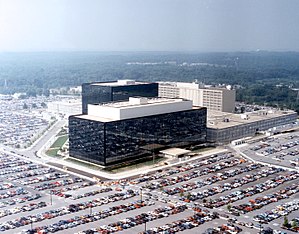| Headquarters of the NSA at Fort Meade, Maryland. Español: Instalaciones generales de la NSA en Fort Meade, Maryland. Русский: Штаб-квартира АНБ, Форт-Мид, Мэриленд, США (Photo credit: Wikipedia) |
One of the things I've always liked about the Internet in general and social media in particular is how easy it makes it to interact with those outside the U.S. The mainstream media in the U.S. devote relatively little coverage to international issues - except in so far as they affect us directly - and almost zero time to providing international perspectives. Our news media are too busy telling us what to think and pushing what often amounts to nationalistic propaganda to be overly concerned with exposing us to what those outside our borders think about or foreign policy or baffling lack of domestic progress. This is where the Internet comes in.
Here are a few of the things I've learned from interacting with people outside the U.S.:
- Our excessive militarism is often perceived as short-sighted and dangerous to global stability.
- Our rampant creationism, fundamentalist religiosity, and anti-science attitudes baffle those living in more enlightened nations. We have so much potential being squandered on superstition.
- Our American exceptionalism and blind nationalism suggest that we really do think we are better than everyone else.
- Our refusal to provide our citizens with universal health care while continuing to allow our people to go bankrupt due to excessive medical costs make us look like savages.
- Our approach to international law is often perceived as hypocritical (e.g., we prevent our leaders from being punished for war crimes while claiming the moral authority to intervene when others commit acts which similarly violate international norms).
- Our constant blathering about "freedom" is difficult to reconcile with the reality that our NSA spies on our own people or fact that we incarcerate a far great portion of our population than the nations we are taught to fear for their repressive nature.
- Our insistence that other countries should adopt a political system most of us complain about as being broken makes little sense.
- We are often perceived as being hopelessly ignorant, largely because of our widespread superstitious beliefs and lack of interest in learning much of anything about what lies beyond our borders.
I cannot defend those of us in the U.S. on any of these points. I agree with each of them. I can ask those who raise them to recognize that there are many of us here who agree with them and do what we can to bring about change in these areas. And yet, I recognize that we continue to elect the people who enact many of these policies, often because we tell ourselves they are the "lesser of two evils." I also recognize that most of us know people who are gripped by superstition and aren't sure what we might be able to do to help them grow beyond it.
What would I have us do differently? For starters, I think we need to recognize that there is real value in the input of others. We need to hear the points above being made, and we need to hear them more often than many of us do now. If our news media will not provide them, we may need to demand them or be willing to seek them out online. We need to listen to criticism, and we need to take it seriously. It is difficult to improve if we refuse to recognize any criticism as potentially valid.
At some point, I hope that we will reach a critical mass of people waking up to the reality that our politics has to be about something other than keeping Republicans out of office. As tempting as that is in the short-term, I simply do not see it succeeding as a long-term strategy to bring about the sweeping change we so desperately need. I think we all know what we need to do (e.g., get money out of politics, hold criminals accountable for the crimes they commit in our names, restore privacy rights, adopt evidence-based policies). The only question is where we will start and when we will finally reach the point where we have had enough.
